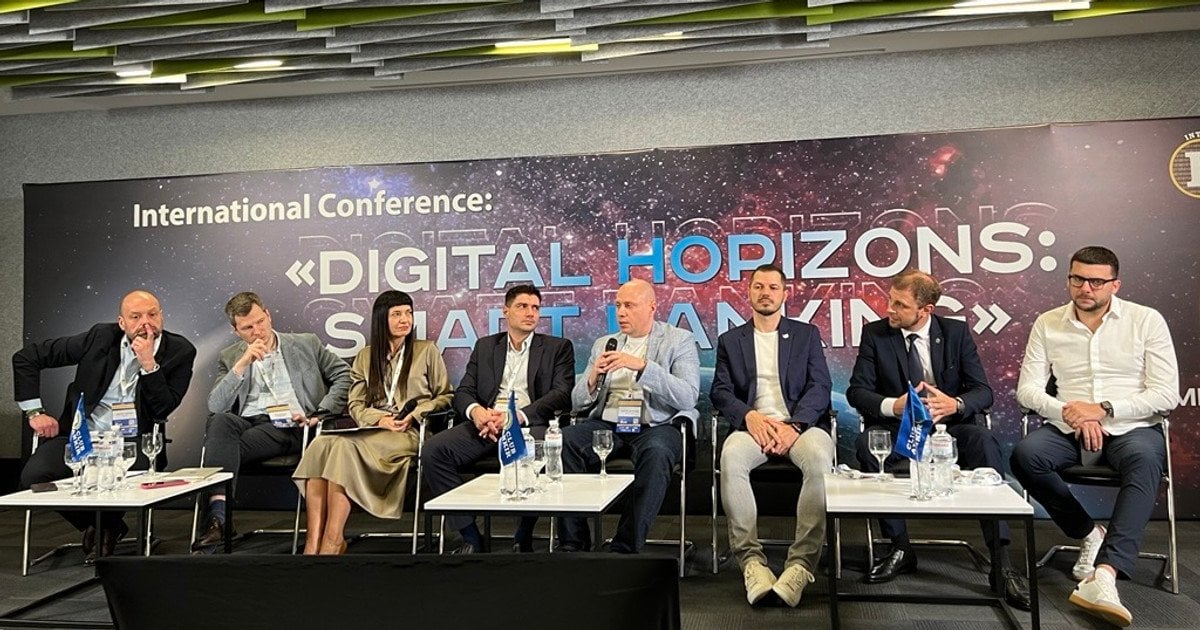Recently, Kyiv hosted the international conference “DIGITAL HORIZONS: SMART BANKING,” organized by the International Financial Club “BANKIR.” The event became an important platform for discussions and exchange of ideas around key challenges and trends shaping the future of digital transformation in the financial sector.

The conference brought together leading experts from the banking and fintech sectors, representatives of regulators, insurance companies, IT firms, and professional associations. Speakers included: Roman Proskurovsky, Head of the Critical Infrastructure Protection Department at the National Bank of Ukraine; Volodymyr Sukhanov, Director of the Department for Supervision of Non-Bank Financial Service Providers at the National Bank of Ukraine; Andriy Dubas, President of the Association of Ukrainian Banks (AUB); Serhiy Savchuk, Director of the Department for Methodology of Regulation of Non-Bank Financial Institutions at the National Bank of Ukraine; President of the League of Insurance Organizations of Ukraine, Chairman of the Coordination Council of the Federation of Insurance Associations of Ukraine Viktor Berlin, as well as CEO of Moneyveo Serhiy Sinchenko and others.
During the conference, experts discussed the key challenges of digitalization in the financial sector, from technology development to modern cybersecurity solutions. They also considered personal data protection, the development of financial ecosystems, and the introduction of new financing models, in particular blended finance, to expand financial inclusion.
The focus was on the regulation of non-banking services and the adaptation of rules to modern conditions in order to ensure transparency and security. Open banking showed how technology provides new opportunities for customers and businesses. Experts also assessed innovations in the development of microfinance organizations, changes in digital insurance, and the prospects for virtual assets, which are opening up new horizons in the financial world.
During the discussion, Serhii Sinchenko, CEO of Moneyveo, shared his vision of the impact of regulatory changes on interest rate policy and business development:

"Moneyveo has always consciously adhered to the principles of responsible lending. We build our business model so that customers receive transparent and fair terms, without excessive high interest rates. That is why the regulator's reduction of the interest rate was not a challenge for us, but rather provided new opportunities. Thanks to the optimization of scoring models, we continued to grow: in 2024, our customer base increased by 10%, and this year — by 15%. The reduction of the rate to 1% was a powerful stimulus for the market: new loyalty programs, flexible discounts, and lending terms comparable to those of banks appeared. This proves that transparent competition improves the quality of service for customers.
At the beginning of 2024, the market faced an influx of “gray” players — companies that lent in cryptocurrency without a license, set inflated rates, and operated according to their own rules. This created serious reputational risks for the entire financial industry. The National Bank played an important role in countering illegal operators by promptly sending recommendations to companies, clearly outlining the course of action — the development of a civilized and transparent market. Members of the Association of Ukrainian Banks supported this position and formulated a common rule: not to advertise on platforms where “gray” services are posted. The market and the regulator worked in sync,“ emphasized the CEO of Moneyveo. ”The first results of cleaning up the sector are already visible today. Moneyveo, along with other responsible companies, adheres to the agreements and, as a matter of principle, does not advertise where illegal services are present. This proves that the market is capable of self-organization and is ready to form transparent rules of the game."
The conference participants came to a common conclusion: the successful development of financial services in the digital age is impossible without a combination of technological innovation and investment in human capital. In particular, training specialists to work with artificial intelligence should be a priority for companies that seek not only to implement AI, but also to effectively adapt it to business needs.
The importance of removing age barriers in the professional environment was also emphasized. The modern financial industry must bring together representatives of different generations — from young professionals to experienced experts — to create balanced, adaptive, and sustainable teams. This approach allows combining the flexibility of new technologies with a deep understanding of processes accumulated over years of practice and creates conditions for continuous professional development.
The participants of the event placed particular emphasis on the fact that it is critically important for MFIs to analyze customer behavior in a qualitative manner — this allows them to make informed lending decisions, reduce risks, and increase trust in the sector.



